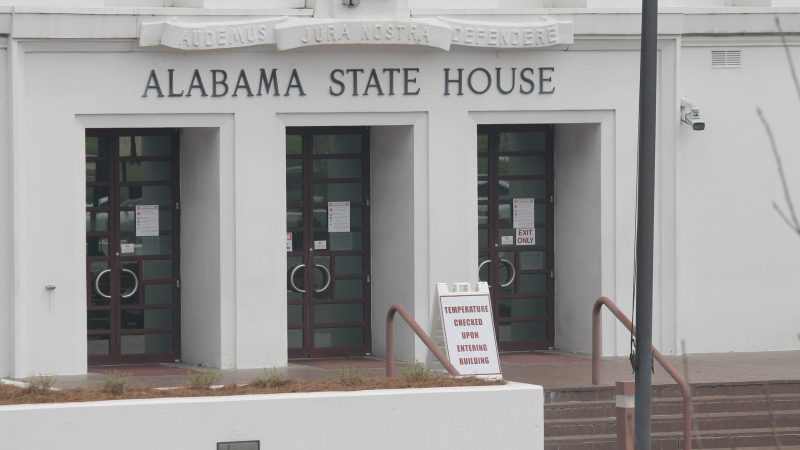Alabama Legislature votes to ban gender-affirming medical care for transgender youth
MONTGOMERY, Ala. — Alabama lawmakers approved sweeping legislation Thursday to outlaw gender-affirming medications for transgender kids and advanced a separate measure prohibiting early classroom instruction on sexual and gender identity, a bill critics have dubbed “Don’t Say Gay.”
The Alabama House of Representatives voted 66-28 for legislation to make it a felony, punishable by up to 10 years in prison, for a doctor to prescribe puberty blockers or hormones or perform surgery to aid in the gender transition of people under age 19. The bill now goes to Republican Gov. Kay Ivey for her signature as Alabama becomes the latest red state to promote legislation and policies aimed at trans youth. Ivey has not indicated whether she will sign it.
The topic of transgender and LGBTQ identity has become one of the GOP’s “wedge” issues aimed at securing votes because they are popular with the party’s base.
Rep. Neil Rafferty, the only openly gay member of the Alabama Legislature, appeared to struggle to hold back his anger and maintain composure as lawmakers headed to the vote.
“This is wrong,” Rafferty said. “Y’all sit there and campaign on family being the foundation of our nation … but what this bill is doing is totally undermining that. It’s totally undermining family rights, health rights and access to health care.”
Republican Rep. Wes Allen of Troy, sponsor of the House version of the bill, argued during debate Thursday morning that transgender youth are not old enough to make decisions about gender-affirming medication.
“Their brains are not developed to make the decisions long term about what these medications and surgeries do to their body,” Allen said.
Rep. Chris England, who serves as chairman of the Alabama Democratic Party, said the measure targets already vulnerable children and essentially tells them they are not welcome in Alabama.
“You’re saying this is about children. It’s not. What it is about is scoring political points and using those children as collateral damage,” England said.
The bill would also require school counselors, nurses and others to tell parents if a child discloses they believe they are transgender.
A spokeswoman for Ivey did not immediately reply to a text message asking if the governor will sign the measure.
“I want the governor to know that she doesn’t have to sign this, she can veto it,” Jeff Walker, whose 15-year-old daughter, Harleigh, is transgender, said Thursday afternoon. “All you are doing is hurting Alabama families with these bills.”
Arkansas approved a similar law in 2021, but it was put on hold by the courts. Advocacy groups in Alabama have vowed to quickly challenge the measure if Ivey signs it into law.
In a written statement, Chase Strangio, deputy director for Trans Justice with the ACLU’s LGBTQ & HIV Project, called the Alabama measure “the most deadly, sweeping, and hostile law targeting transgender people in the country.”
White House spokeswoman Jen Psaki told reporters Thursday that the U.S. Department of Justice has warned states such laws and policies may violate the Constitution and federal law.
“Today’s vote in Alabama will only serve to harm kids,” she said.
The Alabama Senate advanced separate legislation Thursday related to public school bathrooms and discussions of gender and sexual identity in early grades.
Senators voted 26-5 to approve legislation mandating that K-12 students can only use multiperson bathrooms and locker rooms that correspond with the gender on their original birth certificate, rather than their current gender identity.
Republicans in the Senate also added language similar to a law in Florida that critics called the “Don’t Say Gay” measure.
The Alabama language would “prohibit classroom instruction or discussion on sexual orientation or gender identity” for students in kindergarten through the fifth grade.
The Alabama proposal goes further than Florida’s law, which includes grades K-3.
Park Fire in California could continue growing exponentially, Cal Fire officer says
Cal Fire has confirmed that over a hundred structures have been damaged in the Park Fire, which grew overnight near Chico, Calif. Difficult firefighting conditions are forecast through Friday night.
Checking in with Black voters in Georgia about the election, now that Biden is out
Some voters who could be key to deciding who wins Georgia. What do they think about Vice President Harris becoming the frontrunner in the race to be the Democratic nominee?
Tahiti’s waves are a matter of ‘life and death’ for surfing Olympics
Tahiti's Teahupo'o wave has a slew of riders for the Paris 2024 Olympics. NPR finds out why it's called one of the most dangerous waves.
Researchers are revising botanical names to address troubling connotations
Since the mid-1700s, researchers have classified life with scientific names. But some of them have problematic histories and connotations. The botanical community is trying to tackle this issue.
A spectacular opening ceremony wowed a global audience despite Paris’ on-and-off rain
The Paris Olympics opening ceremony wowed Parisians, fans and most everyone who was able to catch a glimpse of thousands of athletes floating down the Seine to officially begin the Games.
Kamala Harris faces racism and sexism as she moves closer to presidential nomination
As Vice President Kamala Harris ramps up her campaign for president, Republicans are trying out new — and old — attacks focused on her race and gender, including calling her a "DEI candidate."


